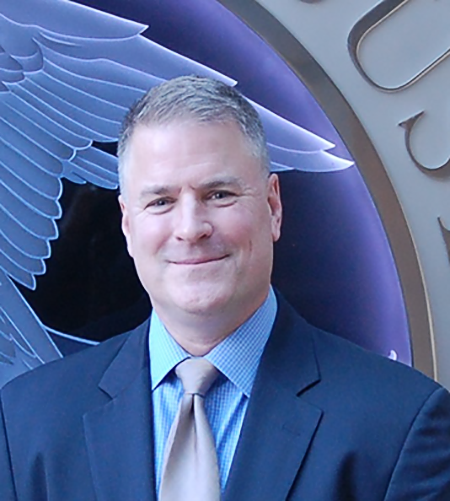Restoring faith in policing
Kevin Dowling, ’90, trains a new generation of law enforcement professionals
Police officers see people at their worst.
Kevin Dowling, ’90, Ed.D., knows. He has spent most of his professional life in law enforcement, both as an officer and educator.
“What always strikes me about those employed in emergency services is their humanity,” said Dowling, 50. “These are the people who run toward gunfire. If you know nothing else, that alone should convince you of the nobility of the profession.”
The nobility of the policing profession has lost some of its luster in recent years, of course, as high-profile cases of police impropriety make headlines. Dowling endeavors to restore respect for our nation’s emergency service providers by living his faith through his work in law enforcement training.
“There are officers who have made grievous errors,” Dowling acknowledged. “In every profession, you’ll find your anomalies of those who have betrayed the trust and confidence they were given by the public. But there are far more emergency service workers making significant gains, living out their faith, and being true to their calling.”

Today Dowling is a deputy chief and training manager for the law enforcement unit of the Board of Governors of the Federal Reserve System who is currently on a temporary detail to INTERPOL – U.S. National Central Bureau, a component of the U.S. Department of Justice in Washington, D.C. In his role for the Federal Reserve System, he trains the mid-sized police force that protects the nation’s financial infrastructure.
He began his career, however, on a slightly different trajectory.
As a student at Loyola, Dowling majored in English and philosophy. He was active in campus ministry and theater. After graduation, he taught high school theology locally before moving to North Carolina. There, he found a police department that was hiring, coupled with an opportunity to transition into a different kind of people-oriented profession. Dowling spent five years as a police officer, although his loves of teaching and lifelong learning were still strong.
“My parents were both educators, and Loyola gave me an appreciation for being a lifelong learner, which has played out in my career ever since I graduated,” he said.
A superior officer caught wind of Dowling’s prowess with words and recruited him to write policy for the department. This role put his career on a new path, one that would move between the worlds of active policing and training at the local, state, and federal levels. Dowling went on to become a full-time instructor and course coordinator for the North Carolina Justice Academy.
He moved back to Maryland when the United States Secret Service asked him to redesign aspects of its curriculum at its training center in Beltsville. Prior to his post with the Federal Reserve System, he was a federal agent in the Environmental Protection Agency’s Office of Inspector General. Along the way he obtained two master’s degrees and a doctorate in education—a modern-day Renaissance man of sorts.
“Loyola taught me the values of critical thinking and logic,” he said. “It also showed me how our faith can be translated into actionable behaviors, even in bureaucratic organizations. Even working in a highly structured environment like state or federal government, we can find our voice as Catholics—and Loyola taught me that lesson.”
Dowling has not arrested anyone in years. His focus now is on training a new generation of officers with the ethics and authenticity he feels called to as a Catholic. Emergency service training has evolved and matured, he notes, with programs that address pressing social issues, including suicide prevention techniques, how to avoid accidental asphyxiation when taking suspects into custody, and etiquette for handling people with disabilities who are in crisis. The latter is a topic on which Dowling has a personal interest; a father of five, he has a daughter with Down syndrome.
“We can live our faith in any profession and at any level of leadership,” said Dowling. “We can be effective without compromising our beliefs. We can tackle hard issues, be they human rights violations or taking someone into custody for a serious crime like homicide, while still treating everyone with dignity.”
Dowling believes it may be education that can refocus public understanding on the many emergency service personnel who do heroic things every day in the course of their normal duties.
“When all social coping mechanisms have completely failed and people are experiencing the worst experiences they will ever experience in their lives—suicide, homicide—that’s when they pick up the phone and call 911,” said Dowling. “And someone is coming. We’ve lost sight of the importance of that.”
He works every day to refocus attention on that message and that truth—someone is coming—and restore faith in policing.